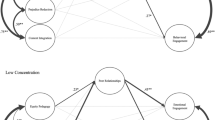Abstract
Fordham and Ogbu (1986) have described fear of “acting white” as a significant factor that influenced the attitudes and often undermined the achievement of African-American students at “Capital High” in Washington, D.C. The present qualitative study investigated 38 relatively high-achieving African-American and Mexican-American students in various high schools, public and private, in a midwestern city. The respondents did not report avoiding academic achievement in order to avoid accusations of acting white. Most of the students we interviewed reported no loss of ethnic identity. The students felt strong resentment toward their peers' accusations of acting white and did not seem to be intimidated by the accusations, though they were bothered by the accusations. It would be useful if future research addressed the conditions under which avoidance of acting white is most likely to occur.
Similar content being viewed by others
REFERENCES
Ainsworth-Darnell, J. W., and Downey, D. B. (1998). Assessing the oppositional culture explanation for racial/ethnic differences in school performance. American Sociological Review 63: 536-553.
Alpert, B. (1991). Students' resistance in the classroom. Anthropology & Education Quarterly 22: 350–366.
Bergin, D. A., and Cooks, H. C. (1997, March). Does the Motivational Promise of a College Scholarship Improve Achievement and Other Outcomes for Aspiring Minority Youth? Paper presented at the Annual Meeting of the American Educational Research Association, Chicago.
Bergin, D. A., and Cooks, H. C. (2000). Academic competition among students of color: An interview study. Urban Education 35: 442–472.
Bettis, P. J., Cooks, H. C., and Bergin, D. A. (1994). “It's not steps anymore, but more like shuffling”: Student perceptions of the Civil Rights Movement and ethnic identity. Journal of Negro Education 63: 197–211.
Collins-Eaglin, J., and Karabenick, S. A. (1993, April). Devaluing of Academic Success by African-American Students: On “Acting White” and “Selling Out”. Paper presented at the American Educational Research Association, Atlanta.
Cook, P. J., and Ludwig, J. (1998). The burden of “acting white”: Do black adolescents disparage academic achievement? In C. Jencks and M. Phillips (Eds.), The Black-White Test Score Gap (pp. 375–400). Washington, DC: Brookings Institution Press.
D'Amato, J. (1988). “Acting”: Hawaiian children's resistance to teachers. Elementary School Journal 88: 529–544.
Fordham, S. (1988). Racelessness as a factor in black students' school success: Pragmatic strategy or Pyrrhic victory? Harvard Educational Review 58: 54–84.
Fordham, S. (1996). Blacked Out: Dilemmas of Race, Identity, and Success at Capital High. Chicago: University of Chicago.
Fordham, S., and Ogbu, J. U. (1986). Black students' school success: Coping with the “burden of ‘acting white.’” The Urban Review 18: 176–206.
Giroux, H. A. (1983). Theories of reproduction and resistance in the new sociology of education: A critical analysis. Harvard Educational Review 53: 257–293.
Jacob, B. A. (1995). Defining culture in a multicultural environment: An ethnography of Heritage High School. American Journal of Education 103: 339–376.
McCardle, C. G., and Young, N. F. (1970). Classroom discussion of racial identitiy or How can we make it without “acting white”? American Journal of Orthopsychiatry 40: 135–141.
Mirón, L. F., and Lauria, M. (1998). Student voice as agency: Resistance and accommodation in inner-city schools. Anthropology & Education Quarterly 29: 189–213.
Ogbu, J. U. (1987). Variability in minority school performance: A problem in search of an explanation.Anthropology & Education Quarterly 18: 312–334.
Peshkin, A., and White, C. J. (1990). Four black American students: Coming of age in a multiethnic high school. Teachers College Record 92: 21–38.
Phinney, J. S. (1990). Ethnic identity in adolescents and adults: Review of research. Psychological Bulletin 108: 499–514.
Sanders, M. G. (1998). Overcoming obstacles: Academic achievement as a response to racism and discrimination. Journal of Negro Education 66: 83–93.
Spencer, M. B., Noll, E., Stoltzfus, J., and Harpalani, V. (2001). Identity and school adjustment: Revisiting the “acting white” assumption. Educational Psychologist 36: 21–30.
Sun, A. (1993). Development of an Instrument for Measuring High School Student Resistance to Schooling. Unpublished doctoral dissertation, University of Toledo, Toledo, Ohio.
Suskind, R. (1994a, May 26). Against all odds. Wall Street Journal, pp. 1, 8.
Suskind, R. (1994b, September 22). Class struggle. Wall Street Journal, pp. 1, 6.
Suskind, R. (1998). A Hope in the Unseen. New York: Broadway.
Ulichny, P. (1996). Cultures in conflict. Anthropology & Education Quarterly 27: 331–364.
Author information
Authors and Affiliations
Rights and permissions
About this article
Cite this article
Bergin, D.A., Cooks, H.C. High School Students of Color Talk About Accusations of “Acting White”. The Urban Review 34, 113–134 (2002). https://doi.org/10.1023/A:1015310332639
Issue Date:
DOI: https://doi.org/10.1023/A:1015310332639




